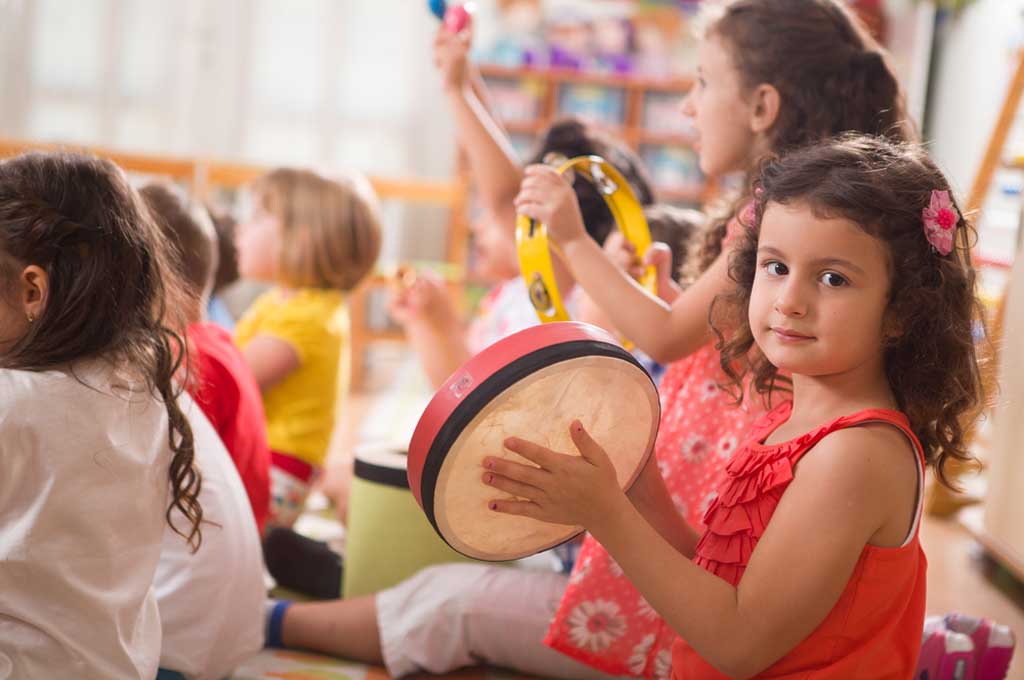The power music has over us as humans is nothing new. People have understood the connection between melodies and the human condition for centuries. In fact, it was the Athenian philosopher Plato who considered music to be a moral law and once said “it gives soul to the universe, wings to the mind, flight to the imagination, and charm and gaiety to life and to everything.”
During the period of childhood from birth to five years old—what we define as “early childhood”—children develop at a phenomenal rate. By the age of 1, the brain of a baby is 70% of its adult size and, by the age of five, that number grows to nearly 90%. It is during this critical stage of development that exposure to music can benefit young learners, though the value of music remains throughout the life of a child.
We’ve gathered a list of 5 reasons why music is so very beneficial in the years of early childhood, particularly when it is incorporated into everyday play.
1. It Boosts Communication and Imagination
Listening to music gives children the opportunity to mimic the sounds and tones they’re hearing. This, in turn, opens neural pathways in the brain that help younger children learn to listen and speak. And, when adults take the time to sing one-on-one with their child, the impact is profound. Research has found that children who have language directed directly at them tend to have more expansive vocabularies as they age.
Sharing a musical experience with loved ones or peers also helps children grow healthy imaginations as they visualize the story told within the song. By listening to music, children can learn how to process big feelings as well as problem solve and empathize.
2. It Helps with Both Gross and Fine Motor Development
Early childhood is a time of significant development of both gross and fine motor skills. Gross motor skills involve using the large muscles of the body—those in the core, or trunk, of the body as well as the arms and legs. Sitting up independently, jumping, skipping, and catching a ball are all examples of gross motor skills.
Fine motor skills involve using some of the body’s more delicate muscle groups. Getting the fine muscles found in the wrists, hands, and fingers to coordinate with eye movement improves fine motor skills and activities like writing, tearing paper, and using scissors promote fine motor development.
You may be wondering how listening to music helps with motor skill development. Anyone who has heard their favorite song come on the radio knows how hard it is to remain still once your tune starts playing. The same is true for children, who often engage in full body movement while listening to music. Clapping, tapping, beating on drums, or playing with toy musical instruments while music plays build strong pathways in the brain and strengthen fine motor skills. And jumping, spinning, rolling, and dancing strengthen the large muscle groups of the body.
3. It Can Be a Bonding Experience
Ask any parent or caregiver who has crooned a lullaby or soft tune to a fussy baby, and they’ll tell you—music can be wonderfully soothing to infants and children, and it has the ability to forge strong bonds.
But don’t take our word for it—researchers have found that babies who were sung lullabies listened twice as long to the song as they did to baby talk or regular speaking.
While playing music while the baby is trying to drift is certainly a good option, there is nothing better than having the soothing voice of a parent or caregiver softly sing a familiar lullaby to solidify the bond between adult and child.
4. It Helps with Social Development
Group music time is wonderful for a child’s social development. Giving each child an instrument and encouraging them to play along with a song encourages cooperative play and builds a let’s-work-together mindset. Dancing to music helps them learn the boundaries of others while setting their own (will we hold hands while dancing or dance side by side?). Engaging in group dances like Ring Around the Rosie, encourage cooperative play and compromise.
Through music, children learn to respect one another and to work collaboratively when necessary.
5. It Builds Leadership Skills
Older children can be assigned the honor of acting as “music director”, either at home or in the classroom. The music director decides what song will be played and, if he or she is comfortable, can lead the group in singing.
Letting children choose what to listen to and practice being a leader helps them hone both their decision making and leadership skills.
The role of music in the development of early childhood skills cannot be overstated. Make sure that music is a regular part of your child’s daily life, and rest assured that your child will be all the better for it.
Thanks for reading,
Clovel Childcare
1300 863 986











